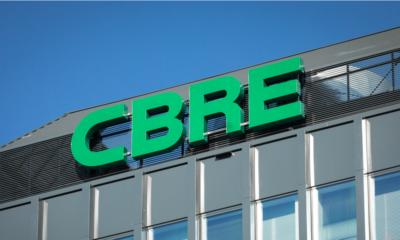News
Real estate savings from hybrid, remote working only one-third of estimates

CBRE South Asia on February 4 announced its findings on emerging workplace trends and the projected impact of COVID-induced strategies on achievable real estate savings.
Evaluating the same, CBRE found that achievable medium-term real estate savings attributable to hybrid/remote working could be 1/3rd of the market estimates.
Contrary to what a number of organisations are projecting, the realistic portfolio savings emanating from hybrid/remote work strategies start to look very different when we overlay factors such as WFH challenges, erratic attendance patterns typically observed through a working week, segments of staff population incapable of adopting remote working due to their workstyles, de-densification impact, etc. Add to this the fact that space savings can’t be uniformly applied to all workplace constituents (such as support/common areas, pantries, receptions, etc), a bare minimum threshold of which is required to support any productive work environment. These factors need to be carefully considered in terms of their implications on office portfolios.
CBRE is of the view that from a workplace strategy perspective, the relevance of physical space will continue, however, the intended purpose of office is likely to be gradually redefined over a period of time; the findings, said.
 Anshuman Magazine, Chairman & CEO – India, South East Asia, Middle East & Africa, CBRE, said, “Corporates are starting to look beyond tactical solutions towards more medium to long term RESET strategies. We are seeing the focus gradually moving from cost savings to the intended purpose of workplaces in future. Curation of office spaces to compete with or supplement working from home will define the future workplace experience.” Essentially, these conversations would continue to play a critical role in determining success of workplace strategies implemented across sectors going ahead.
Anshuman Magazine, Chairman & CEO – India, South East Asia, Middle East & Africa, CBRE, said, “Corporates are starting to look beyond tactical solutions towards more medium to long term RESET strategies. We are seeing the focus gradually moving from cost savings to the intended purpose of workplaces in future. Curation of office spaces to compete with or supplement working from home will define the future workplace experience.” Essentially, these conversations would continue to play a critical role in determining success of workplace strategies implemented across sectors going ahead.
 Ram Chandnani, Managing Director, Advisory & Transactions Services, CBRE India, said, “The current pandemic is accelerating changes in performance, expectations and role of the workplace. Successful strategies would be the ones which are able to envision a practically implementable Future of Work concept, effectively leveraging potential changes in workstyles and corresponding opportunities to rebalance the workplace; While the relevance of physical space is here to stay, the purpose it would serve going ahead is what the focus needs to be on.”
Ram Chandnani, Managing Director, Advisory & Transactions Services, CBRE India, said, “The current pandemic is accelerating changes in performance, expectations and role of the workplace. Successful strategies would be the ones which are able to envision a practically implementable Future of Work concept, effectively leveraging potential changes in workstyles and corresponding opportunities to rebalance the workplace; While the relevance of physical space is here to stay, the purpose it would serve going ahead is what the focus needs to be on.”
CBRE further highlighted that results from a recently completed Occupier Survey need to be carefully viewed in consonance with workplace & portfolio optimisation initiatives being currently evaluated by organizations and the resultant RE savings being estimated. Mr. SumitArora, Head – National Operations & Workplace Strategy, CBRE Consulting, India said, “Achievable real estate savings attributable to hybrid/remote working could be only 50% (in certain cases as low as 33%) of what the market is estimating. Holistic RE + People strategies & principles, supported by the right forward looking operating & technology platforms should be considered while resizing office space requirements with a fair degree of certainty. Further, there is an added layer of de-densification impact & targeted design interventions which needs to be carefully considered in terms of its implications on one’s portfolio size.”
CBRE’S Perspective on key workplace trends
Future Outlook:
Flexibility Related:
- Hybrid working is expected to sustain, though, the intensity and fitment would need to be carefully considered in line with expected changes in Work, Workforce & Workplace nuances
- With Activity Based Working and Telecommuting becoming a core part of business and RE strategy, corporates can expect an improved ability to accommodate flexibility within portfolios
- Greater emphasis on virtualised monitoring and productivity measurement to emerge going ahead
Wellbeing Related:
- CBRE foresees investment in higher quality buildouts, with wellness related certifications emerging as competitive advantages in talent attraction, retention & brand curation
- Technology to serve as a key enabler in bolstering wellness related strategies & employee safety, along with an overall increase in wellness spends
- Revision in codes / regulations mandating healthier building operations & in certain cases, even amended occupancy standards may be looked at
Workplace Re-Balancing Related:
- We can expect a more deliberate, considered approach to forecasting future space demand
- Workplaces would evolve to become a destination for intended purposes (varying across teams / individuals)
- Expected reinvention of collaborative & social / amenity spaces in office, to create augmented experiences for in-person and remote participants
- Defining the Future Workplace Concept would become a critical driver impacting office space positioning & any corresponding design / space re-balancing implications
• Use of technology as an enabler in context of managing real time occupancy & flexibility in the workplace is expected to be a key differentiator in a potentially hybrid environment
-

 News3 weeks ago
News3 weeks agoMumbai’s Largest Trimandir Opens in Thane with Grand Three-Day Pran-Pratistha Ceremony
-

 News3 weeks ago
News3 weeks agoBudget 2026: Real Estate Sector Awaits Real Reform, Targeted Relaxations For Boost
-

 News3 weeks ago
News3 weeks agoUnion Budget 2026: Infrastructure-Led Growth Sets Stage for Real Estate Expansion Beyond Metros
-

 News4 weeks ago
News4 weeks agoHousing.com Expands Footprint to 15 Tier II Cities, Strengthening Presence in Emerging Residential Markets
-

 News3 weeks ago
News3 weeks agoNCDRC Directs District Magistrate to Take Over Control of Much Delayed Greater Noida Project
-

 News4 weeks ago
News4 weeks agoLuxury Housing in 2026: Experience, Exclusivity & Design-Led Living
-

 News2 weeks ago
News2 weeks agoJewar Airport ‘Ready’, Likely to Be Inaugurated by PM Modi By Late Next Month
-

 News3 weeks ago
News3 weeks agoBudget 2026 Positions Tourism & Hospitality as Economic Multiplier, Not Support Sector












































